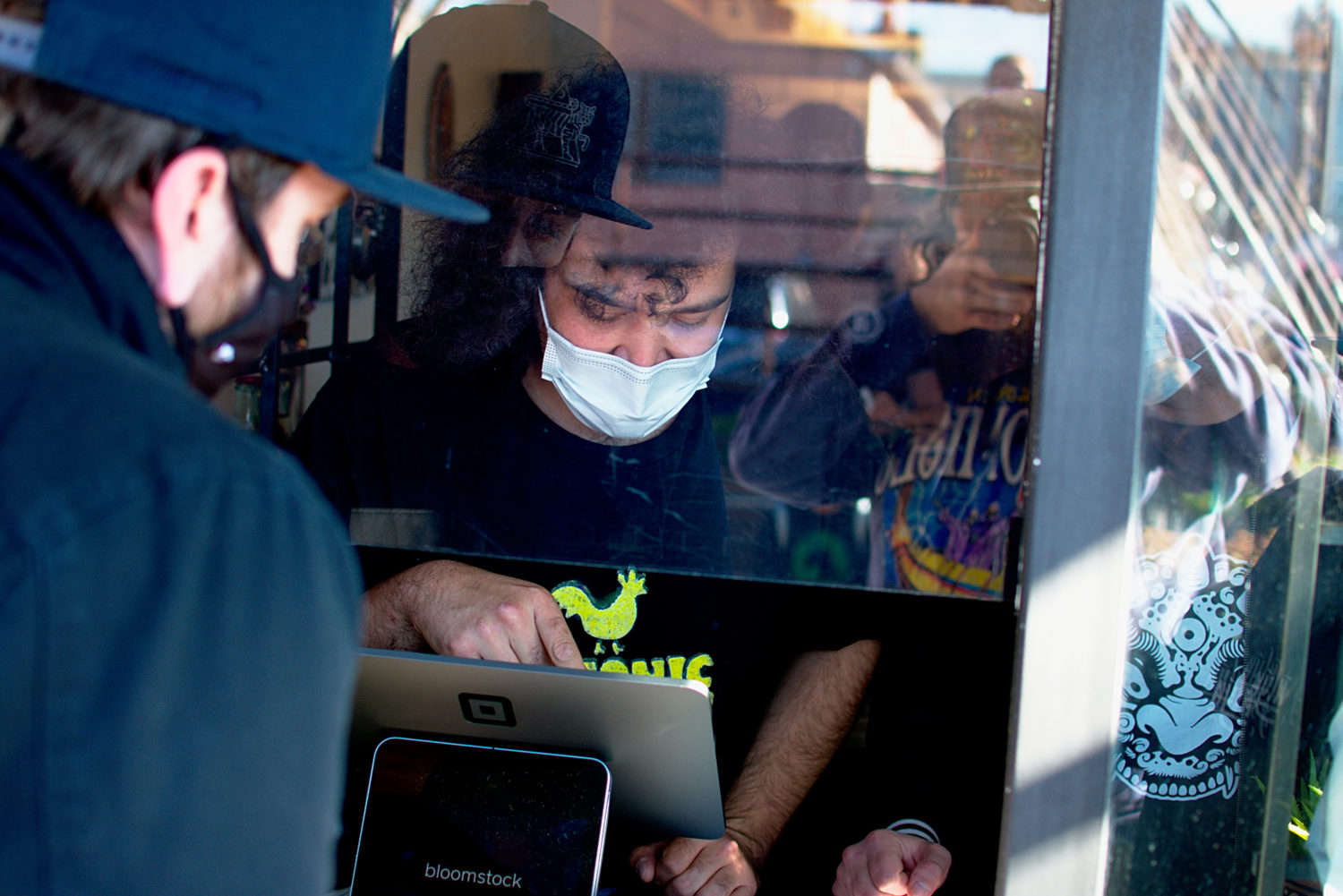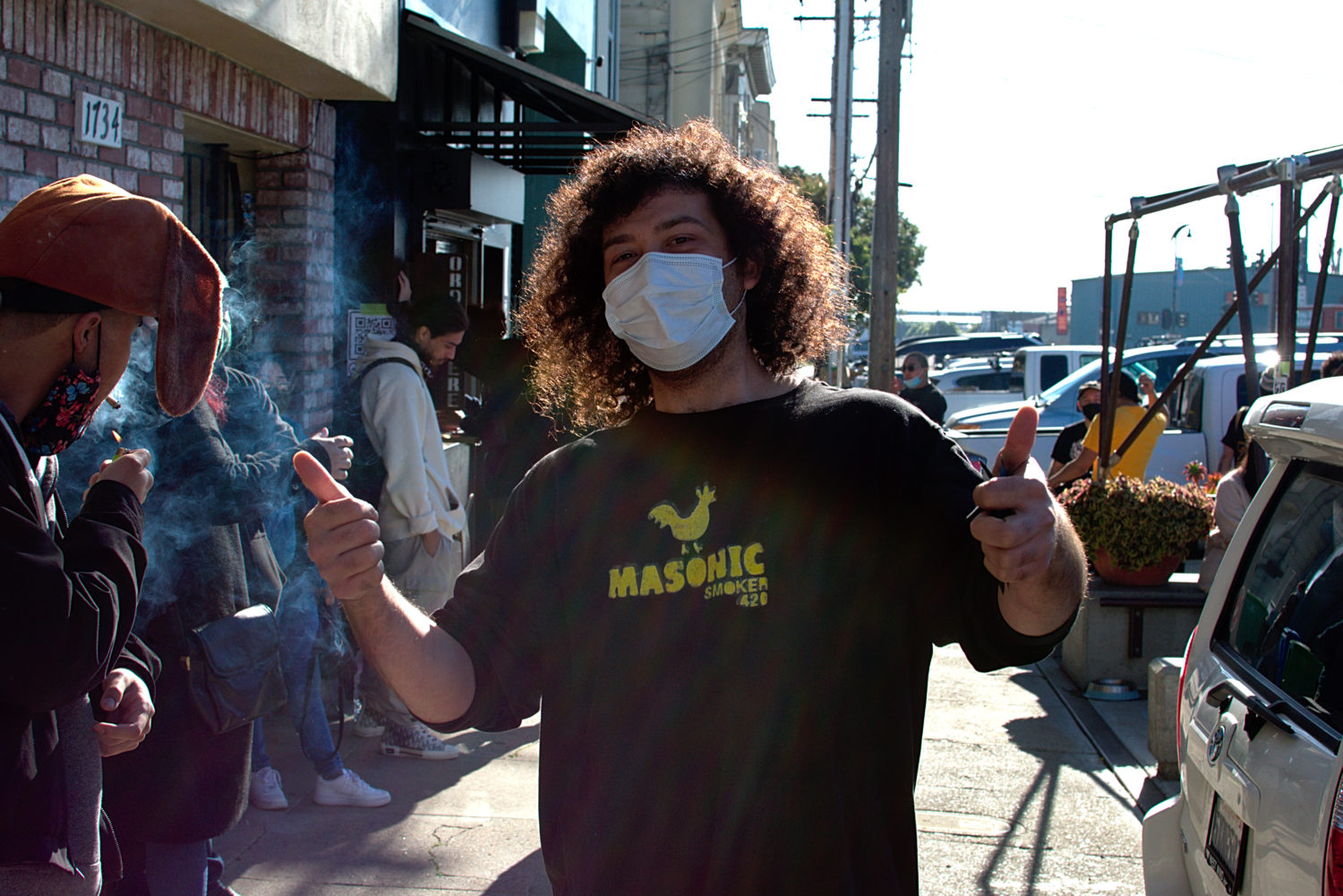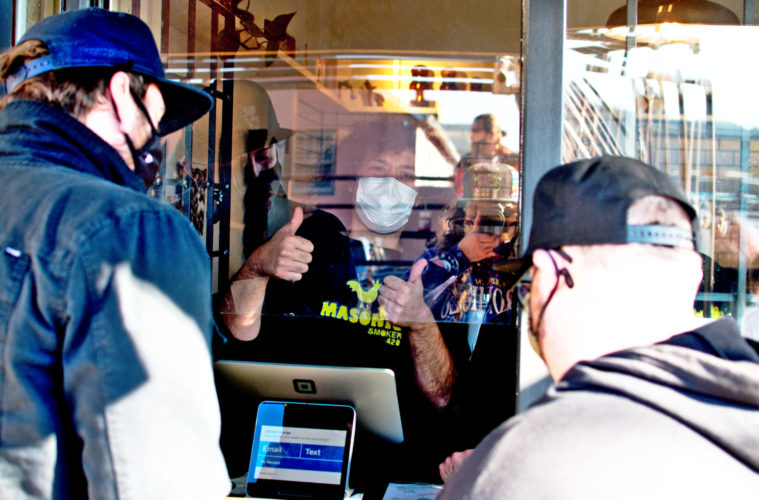Love him or hate him, the legend of the Compton Landrace has permeated well beyond the borders of Los Angeles. We hit Masonic Seed Company’s San Francisco popup last week before getting to sit down and chat with Masonic himself to hear his take on the wild ride he’s been on the last few years.
Masonic is what they call a needle mover. After I posted from the popup, just the idea that I’d be writing about him flooded my inbox. It was a spread of admiration and accusation from message to message, and it only made me more excited to dive in.
I understood that Masonic was popular and on his way up over recent years. But when I saw the social-distanced line stretching through the industrial sector of South San Francisco on a Sunday at 9 a.m. it seemed like things were pretty hype. Some random person recognized me and walked up to me with a handful of Gelato #33 x Wilson – it was awesome whoever you are – then I waited with some friends for an hour, eventually getting to the front where they placed their seed and coffee order with Masonic. Hearing how many packs of what? Or do you want milk with that? Was certainly a thing. 
Eventually, Masonic and I got our hellos in and planned out a chat for later in the week.
The Early Years
We immediately jumped in on how he first got his hands in the dirt while growing up in the epicenter of cannabis.
“I grew up going to the dispensaries when some were shadier than others, for sure. There were no kiosks and somebody that looked preventable helping you out. That’s kind of how it was,” Masonic told L.A. Weekly. “Lord knows we could buy more than weed there but I stuck to the weed.”
He emphasized he didn’t want to claim to have seen it all because he didn’t want to sound like an asshole, but was confident he’d had eyes on a fair share of the evolution of the cannabis consumer and grower over the last decade.
But when did he decide he wanted to supply his habit?
“So I graduated high school, my dad buys me a pound of weed,” Masonic said, noting he’d been accepted to school and completed advanced placement classes. “I was a good kid but my only ‘problem’ was I just smoked all the fucking time.”
That pound a decade ago was meant to be a post-high school toe-dip into providing for his habit. Unfortunately, Masonic and his now-wife found themselves at the mall a lot. “So he buys me this pound of weed, and I just fuck it all up. I just sell whatever, you know, go to the mall every weekend. buy freaking DVDs and comics,” he said.

Meeting Ray
Masonic’s dad would get him another shot after meeting a cultivator in his car club.
“He met a guy named Ray, rest in peace. My dad knows firsthand how a person grows and what they can grow and the money that might come with it. So he kind of introduced me to him and he’s like, hey this guy is gonna teach you some stuff. And I’m like, okay, here goes nothing,” Masonic said. “And as far as before, cultivation started being introduced to me, before that I was just a jackass smoker just trying to find the best bag of weed.”
Masonic’s dad grabbed Ray and Masonic 15-gallon barrels for his boy to learn the craft, and he did. Ray helped Masonic add all the fundamentals of cultivation to his toolkit. As for the genetics he was working with at that moment?
“Ray? I’d be lying if I told you anything specifically,” Masonic replied, and as for adding to Ray’s lessons, “There wasn’t Instagram, or at least I wasn’t on it yet. Just kind of like whatever I found on the internet, whatever publication I could pick up that floated through my fingers. That’s what I had besides this guy.”
We asked Masonic if the way he went about collecting cultivation knowledge outside Ray in those early years was more of a clearinghouse to find the best techniques as opposed to the forums people flocked to when cannabis was still sketch?
“Exactly. Like till this day I’m not even privy to all those things. Like all the forums and shit. I was 17, 18-years-old, you know? I shouldn’t have been on there. That would have been weird. I would have been like a prodigy, like what is this kid doing talking to all these men?” he replied.
Digital Infamy
When he eventually got on Instagram, he started picking bits and pieces of technique from the big dogs. Once you get to a certain level of hyper elite, it doesn’t matter if people know how you do it because you are a special talent. Everyone knows how Lebron dunks but doesn’t feel like it has the same bang when most other people do it. The same can be said for people who grow the heat. Masonic’s base of knowledge continued to expand from his original work with Ray.
“I get amused until this day. I keep it simple, but Lord knows there’s so much shit to learn and once I started learning it’s like a snowball effect,” Masonic said. “So I know what I know and it’s not that I try to stick to it but for the most part I stick to it because then I dive down the rabbit hole of knowledge that I might not even apply to my remedial production.”
But over the years, the tech sunk in.
“I started in those pots and doubled, and doubled, and doubled and here we are today,” Masonic said.
We asked Masonic when he felt the urge to dive into his own genetic creations. He said for the longest time he was just running bag seed.
“Don’t get me wrong, I’d get cuts here and there from any dispensary I go to for sure, but I wouldn’t put my money on it,” he explained. “I would just be like, okay cool, another plant. To me, every plant had potential. I was very novice.”
The first phenotype he cherished ended up being an Afgooey his cousin brought him. Masonic made some hash in his yard with it that blew away the bag seed he had been working with. It was one of his early experiences understanding why phenotype selection was so important in getting the best results, not just the name of the strain.
The First Elite Clones
This fact would sink in even further when Envy Genetics gifted Masonic The Village’s special phenotype of Purple Punch. The Village helped get Purple Punch out to the masses as half of Symbiotic Genetics after they got permission from the original breeders Supernova Gardens. Masonic was one of the first of his peers with it.
The next round of special ones Masonic got his hands on would be from Oni Seed Co. The GMO and Triangle Kush he received are staples of some of the biggest gardens in the state to this day for their production value.
As all these cuts are coming his way, the memes are starting to pop off. The numbers are going up. Masonic continued his attempts to further up his game. “I turned into an organic grower, and then I turned into a Korean natural farming grower and then I found out that at the end of the day, you’re just looking for good tools and whatever you need to use to get there. As long as they’re ethical, you’re good to go. Little by little, I just kind of put my nose in a little bit of everything but quickly. I didn’t dwell in it too long.”
We asked Masonic when he knew things were starting to pick up. When did the Compton backyard cultivation meme hype takeover? He replied that it will be two years since he quit Rite-Aid in June.
“So that’s when I felt comfortable. At Rite-Aid my boss was really flexible and I would always tell him I sold t-shirts. He’s like dude, how the fuck are you going to Europe every three months? And I’m like, t-shirts man. The people love me. They want my t-shirts,” Masonic said. “I felt I could focus solely on Masonic. But don’t get me wrong, while I was at Rite-Aid I was doing okay.”
Eventually, Masonic realized it wasn’t making any sense or cents to keep the gig. We asked if the attachment was some balance between enjoying the familiarity of the job and having a declarable income.
“Yeah, exactly,” he replied. “People would be like, hey man, I got this million-dollar opportunity for you and I’m just like, nah I got to go to Rite Aid. I gotta clock in.”
Masonic was still growing to supply his habit at this point and selling the rest. He said he eventually had an accidental pollination on a Tropicana Cherry Pie Tangie. That strain was originally bred by Harry Palms. “I kept it pretty transparent. To this day, it’s like I don’t know what the fuck it is but people still demanded it.” Through some local collaboration, he would dust the TCPT with Subcool’s Plush Berry and Agent Orange.
“But sure enough, I do these Tropicana cherry pie tangy hybrids. People fucking love them, so I’m like, hey, I’m just gonna fucking make seeds,” he said. “So sure enough, I didn’t just make seeds, but I asked people before I did them so the next set of seeds that I did was like the Tropicana F2 that I hit to all those Papaya femmes, and I sold those. Well, I worked with Oni and gave those to him for his flag. And kind of just worked my way up to where I’m at now.”
Wilson
Eventually Masonic would create the Wilson, originally known as Castaway Tropicana F2. While now one of his most wildly popular strains and the basis for a lot of his work moving forward, it would carry some of the most controversies over the years. Masonic argues he got permission from Harry Palms while he was still under the Oni flag, but then Oni Noodles hit up Masonic to ask what the deal was with him using his genetics. He explained the miscommunication around not realizing how many times he needed to hear yes before chucking pollen and Oni ended up buying the seeds. He wasn’t trying to burn any bridges, he didn’t even know he was holding matches.
The Controversy
But this is still a chord the haters certainly play, attempts to call Masonic’s work a knockoff on Harry Palms effort is like Stairway to Heaven at Guitar Center. In addition to that, the talking heads of cannabis social media attempted to put Masonic under the umbrella of other legal issues that arose at Oni. I had two different people send it to me just when they heard I was writing about him and asked Masonic about the situation so the article wouldn’t look like a rec league softball game.
“I’m sorry. They love to hate me,” he replied. “They love to hate me and it’s like, I don’t know, a lot of misinformed people. Like you were saying, I do play the character. I did play the character, you know, kind of poked at people for not too long.”
Masonic argues some of his past spats on the internet, which he would argue he won by KO, left a bad taste in the mouth of others.
“I kind of took some people down that people really liked,” he explained. “So, you know, there’s a reason why people might not like me but most of all it’s just misinformed. A lot of misinformed people. That redacted document floating around that has zero to do with me. My name is not even on it.”
Masonic said that to continue arguing over the document would be like fighting stupid. “You can’t make everybody happy. That’s another one of my problems. I’m always trying to make everybody happy.”
The point people try and hit Masonic on about not testing his seeds, Masonic argues he’s not exactly asking people to dive into their bitcoin for the untested seeds compared to a market that’s seen prices go as high as $750 for Peanut Butter Runtz in recent months.
“I’m not like charging $500 for it. I’m charging anywhere from $50 to $100 and it comes with two freebies. It’s $30, or a lottery ticket for a namesake, for something that you can take and do whatever the fuck you want with,” he said. “So yeah, sure, I’d be mad if I were selling untested packs at $500. But then again, people shouldn’t be mad about where people shop and what they do with their money. That’s kind of stupid. I don’t complain that people go shop and buy shit that I don’t give a fuck about. That’s stupid.”
The Neighborhood
We asked Masonic if any of his peers in Compton who keep it a bit more low key ever thought he was nuts as he continued to gain more eyes on what he was doing in his yard?
He confirmed that they did. “I’m just in my backyard, literally just doing my little numbers and they think I’m crazy because I’m growing in my backyard under the sun. But I think they’re fucking crazy. Because they’re putting a lot of money into it and to me, it’s more of a gamble. But to each their own, you know?”
Advertising disclosure: We may receive compensation for some of the links in our stories. Thank you for supporting LA Weekly and our advertisers.

